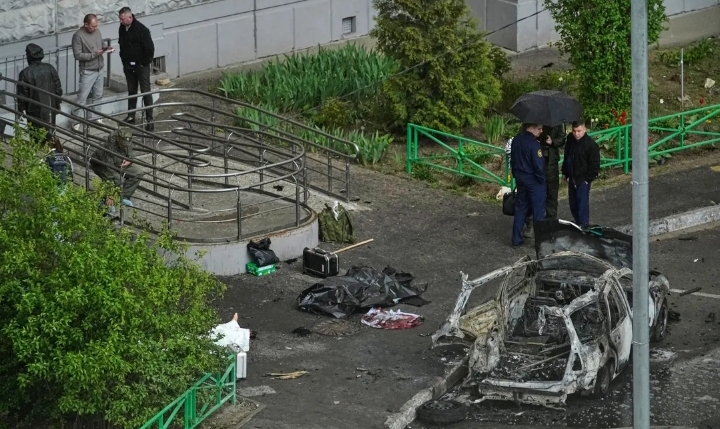A senior Russian general, Yaroslav Moskalik, was killed in a car explosion near Moscow, an attack similar to previous assassinations linked to Ukraine. Russia opened a murder investigation, while Kyiv has not commented. The attack reflects ongoing tensions and retaliatory actions tied to the conflict in Ukraine.
Russian General Dies in Car Bombing Near Moscow


An explosive device detonated in a parked car near Moscow on Friday, resulting in the death of a senior Russian general, according to investigators. The attack mirrored previous assassinations attributed to Ukraine. Authorities identified the victim as General-lieutenant Yaroslav Moskalik, the deputy head of the main operational directorate of Russia's military General Staff, which oversees army operations. Kyiv has not commented on the incident, although the attack carried the characteristics of other high-profile killings of military figures and staunch Kremlin supporters over the past three years. Ukraine has referred to some of these individuals as "legitimate targets" and views such attacks as acts of retribution for Russia's military campaign, which has claimed tens of thousands of lives.
Russia's Investigative Committee announced it had initiated a murder investigation after a Volkswagen Golf exploded outside a residential building in Balashikha, a town east of Moscow. Russian foreign ministry spokeswoman Maria Zakharova stated, "Our military figure was killed as a result of a terrorist attack." The general's body was found near the front door of the apartment complex, just a few meters from the charred remains of a white car, its rear section destroyed. Footage from the scene, posted by the Investigative Committee, showed the aftermath, with several investigators present. Police had sealed off the area, and ambulances were seen surrounding the location.
A loud explosion was heard around 10:45 a.m. (0745 GMT), and locals reported feeling the blast's intensity. "The explosion was very strong, it even gave me heart pain," said Lyudmila, a 50-year-old resident. The attack bore similarities to previous assaults claimed by Kyiv on individuals connected to Russia’s ongoing offensive in Ukraine. In December, Ukraine's secret services took responsibility for the assassination of the head of Russia's military chemical weapons department, who was killed by a bomb attached to a scooter as he left an apartment in Moscow.
Security camera footage, published by the Izvestia newspaper, captured the moment of the explosion, showing a powerful blast that scattered debris into the air just as someone approached the vehicle. Investigators confirmed the explosion was caused by an improvised explosive device (IED) packed with metal fragments designed to inflict maximum harm. According to the Agentstvo investigative news site, Moskalik lived in Balashikha, though the Volkswagen was not registered to him. Unverified reports from Russian Telegram channels, linked to law enforcement, suggested that the car had been purchased a few months prior by a man from Sumy, Ukraine. These reports also indicated that the vehicle had been parked outside the building for several days and contained a camera.
TASS reported that Moskalik was 59 years old. The Kremlin's official website mentioned that he had represented the Russian military in ceasefire talks with Ukraine in 2015 during the conflict between Kyiv and Russian-backed separatists. In 2021, Russian President Vladimir Putin promoted Moskalik to the rank of general-lieutenant. The department Moskalik led was described by the independent outlet Vazhniye Istorii as a crucial part of planning military operations in Ukraine.
Over the past three years, individuals linked to Russia's military actions in Ukraine have been targeted in various attacks. Notable incidents include the August 2022 car bombing that killed nationalist Darya Dugina and the April 2023 explosion in a Saint Petersburg cafe that claimed the life of prominent military correspondent Maxim Fomin, known as Vladlen Tatarsky. While Ukraine has occasionally taken responsibility for such attacks or expressed satisfaction, it has remained silent regarding the killing of Moskalik. After the December assassination of Igor Kirillov, Russia's military chief of chemical weapons, Putin acknowledged the failures of Russia's security agencies. "We must not allow such very serious blunders to happen," he remarked.

 বাংলা
বাংলা  Spanish
Spanish  Arabic
Arabic  French
French  Chinese
Chinese 
